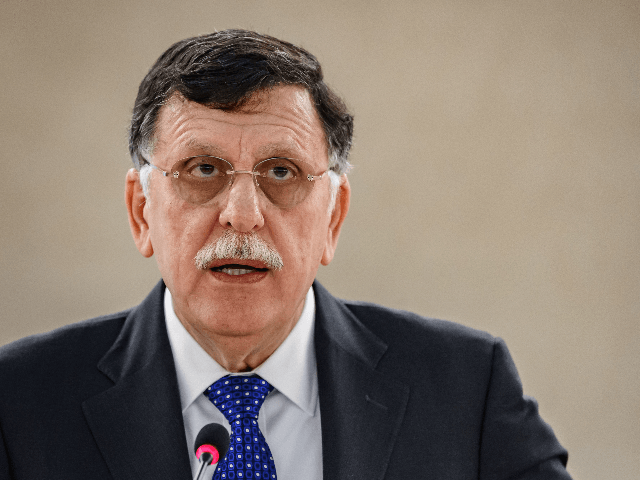Faiez Mustafa Serraj – prime minister of Libya’s internationally-recognized, Tripoli-based Government of National Accord (GNA) – told the 2020 United Nations General Assembly on Thursday that unification and reconciliation remain distant goals for his war-torn country despite the “great sacrifices” made by the Libyan people.
Serraj blamed the enduring state of conflict in Libya on adversaries who wish to “seize power and rule by force.”
“The heroes of our army and armed forces have proved they are the bedrock that will defeat everyone who seeks to return our country to dictatorship and one-man rule,” he said, implicitly drawing a line from late dictator Muammar Qaddafi to the GNA’s current nemesis, Gen. Khalifa Haftar.
Serraj congratulated his armed forces for preventing “the invader,” Haftar, from entering Tripoli last year, saying the city “remained resilient in the face of a tyrannical attack led by the aggressor and the militias that support him.”
“The resulting human and material loss are too much to enumerate here,” he said. “With the sacrifice of our heroes during the ‘Volcano of Rage’ operation, we were able to deter and defeat the aggression.”
“This is unacceptable. It violates Libyan sovereignty and independence, and U.N. Security Council resolutions, and international law and custom,” he said, calling on those states to “revisit their positions” and withdraw their support for Haftar before his inevitable defeat. He invited foreign powers to “discuss their concerns” with the GNA, rather than supporting a military force determined to overthrow it.
Serraj said the “aggressor” was supported by “mercenaries and material” from countries “known to everyone and mentioned in U.N. reports.” Haftar’s major-power foreign supporter has been Russia. He also enjoyed support from the United Arab Emirates, Egypt, and reportedly Saudi Arabia, plus a few parties the West that had grave misgivings about militias allied with the GNA or thought Haftar was better positioned to united the country under a stable government.
Serraj cited the GNA’s participation in various peace initiatives as proof that it desires “peace, not war,” and wishes to prevent further “bloodshed and loss of life.” He noted that his government called a ceasefire on August 21 in light of the coronavirus threat, and has called for elections by March of 2021.
Serraj said that a lasting resolution to the Libyan conflict will require foreign powers to remove troops and weapons from Libyan territory, especially singling out the cities of Sirte and Jufra. Sirte and Jufra are the cities Egypt has named as the endpoints of a “red line” that will trigger military intervention in Libya if extremist militias or Turkish forces allied with the GNA cross it. Serraj insisted the GNA has absolute sovereign control over all Libyan territory and called for all of the country’s ports and oilfields to be reopened, free of outside influence.
According to Serraj, the Tobruk-based rival government that supports Haftar has been receptive to offers of a ceasefire, but “we have not yet seen cooperation from armed groups and the aggressor’s militias.”
“We hold them responsible for any military confrontations and any resulting casualties and destruction,” he said.
Contending that only a full national unity government with the support of the international community can begin restoring Libya’s economy and protecting the interests of its people, Serraj called for universal participation in the next round of elections and universal recognition of its results, saying all parties are welcome to participate except “anyone whose crimes have been legally proven and who has spilled Libyan blood.”
Serraj pledged the GNA’s support for human rights and its opposition to “terrorism in all its forms,” noting that some of the terrorist organizations active in Libya brought in “foreign fighters,” notably including the Islamic State, and used this imported muscle to seize Libya’s national assets for “evil schemes.”
Serraj stressed the importance Libya places on the issue of “irregular migration,” noting that huge numbers of migrants have “exposed themselves to great dangers and the evil of trafficking networks” which trying to reach Europe from Libya.
He said the GNA is eager to work with international organizations to develop more information about migrants in Libya, but rejected “unilateral reports containing inaccurate and exaggerated information,” presumably referring to reports by human rights organizations that accuse the Libyan government of treating migrants poorly and allowing them to be forcibly recruited by militias. He said those reports understate the GNA’s efforts to “serve the interests of migrants” and overlook the half-million irregular migrants living peacefully in Libya.
“Libya is a victim of migration, not its reason,” he said. “Accordingly, we reaffirm that the ideal solution is to address the root causes of migration. The international community must assist the countries of origin, encourage them to implement real development programs, and improve their performance. Everything possible must be done to address poverty, unemployment, and all the hardships that drive people to embark on life-threatening journeys.”
Serraj went on to call for Libya assets frozen since 2011 to be released to the GNA, for sanctions to be lifted, and for the international community to help it recover funds that were shifted outside the country.

COMMENTS
Please let us know if you're having issues with commenting.